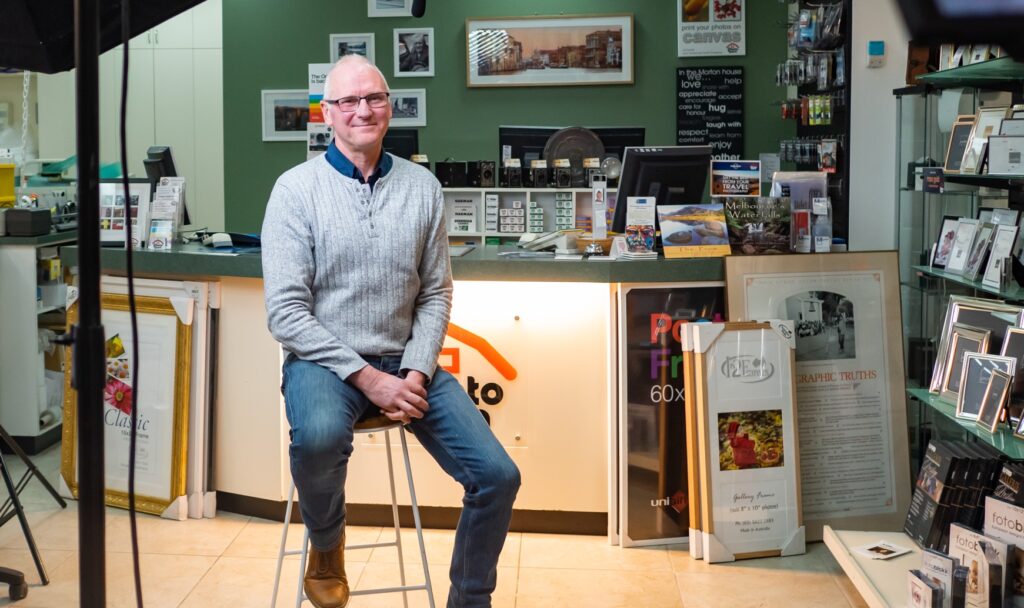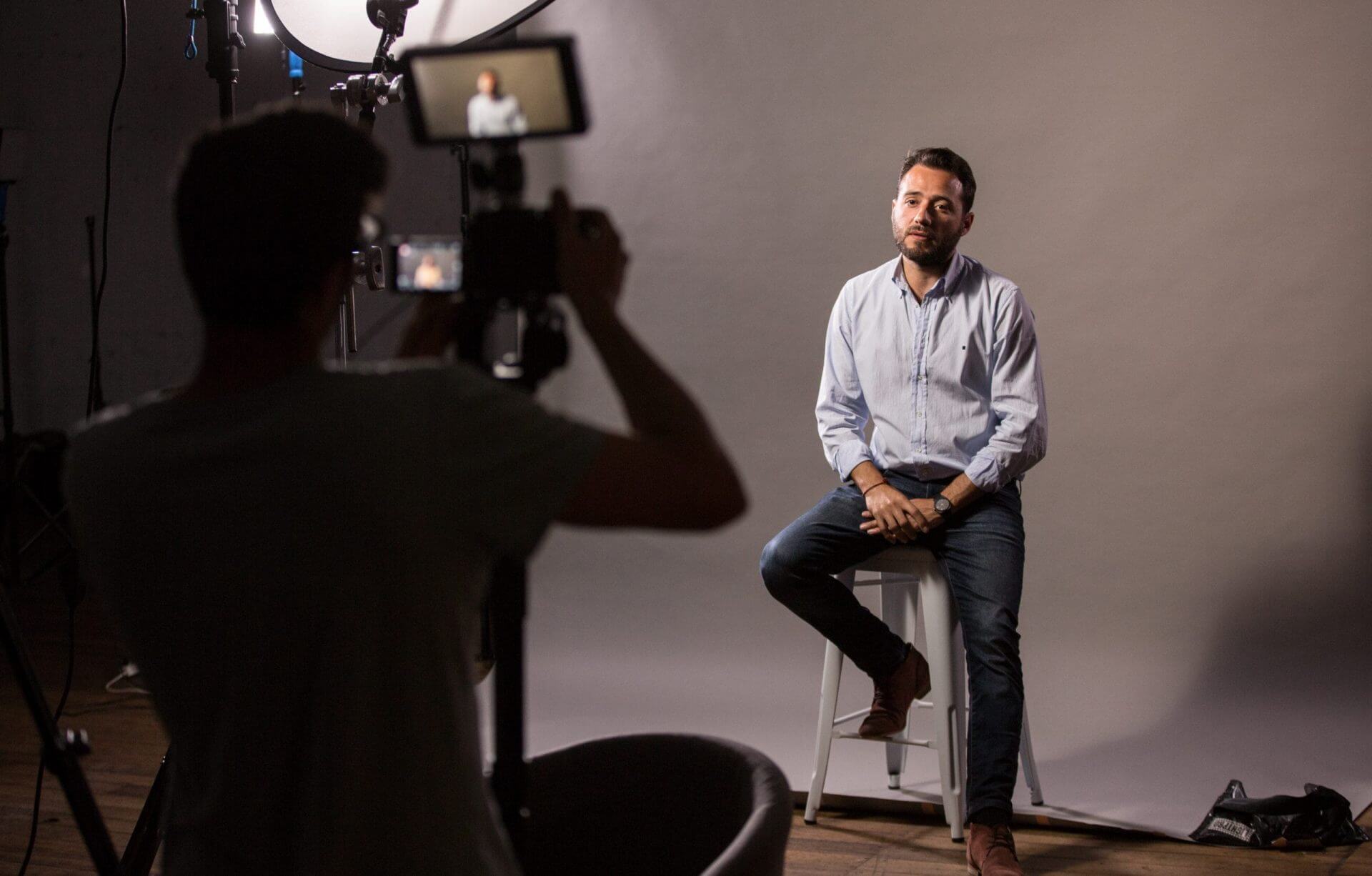Is an interview the best choice for your video production project?

James Walker

Ro Mukerjea
13 min read

When creating marketing videos for businesses, people often use interviews as their go-to way of delivering their message. It’s like a default, at this point.
And not without good cause. An interview is an established technique in video production that is simple – ask someone a question and they respond. It allows you to plan simply and move quickly into production.
It’s become so ubiquitous that it’s almost become synonymous with ‘corporate’ or ‘business’ video production. But despite its popularity, an interview shouldn’t necessarily be your go-to style of communication. There’s a wealth of different communication styles in your toolkit that could be better suited to your business, your brand, and your message.
What is an ‘interview’ video?
The quintessential interview video is one you’ve seen over and over: a medium shot of a person, generally from the waist or chest up, responding to questions asked by a mysterious person just off the screen. The interviewer’s questions are omitted from the final edit, so you’re left with a video that consists of a series of responses, one after another, often with b-roll footage.
Example of a quinteessential interview video: Dropbox Customer Stories (Australia)
For clarity, this is a different video production method to a person delivering a scripted message to camera. Often these can look similar, but they are a different communication style.
Example of a scripted message video: President Obama reflects on 2022
When should you use interviews in your video production?
With great interviews comes great responsibility—so you have to know when, and how, to use them effectively. Sometimes they turn out great, and sometimes they sound like a series of quotes mashed together, taking the viewer on no journey whatsoever.
So let’s take a look at when and why interviews should be used in your next project.
Reason #1: When opinion and insights from an individual are important.
If you were to take video production out of the equation, and just think about communication in general, an interview is simply a back-and-forth exchange, seeking answers to questions about a topic. The interviewer would only ask the interviewee questions about something that the interviewee is qualified to speak on, or has a valuable perspective on. In the world of video production, the interviewer is a proxy for the audience.
So in other words – when a person’s opinion adds value to the communication, then an interview is a great option.
Reason #1: When opinion and insights from an individual are important (DNA Screen: Eve’s Story, Posterboy Media)
Reason #2: When a human, natural, authentic approach is important.
Using an interview means you are placing great emphasis on the individual. It is their voice delivering your intended message, and their face on screen for large parts of your video. It is meant to feel natural and conversational – not a forced, scripted piece of marketing.
By nature, an interview conveys humanity and authenticity. This needs to be important to your desired outcome.
Reason #2: When a human, natural, authentic approach is important (Diabetes Victoria: Life!, Posterboy Media)
Reason #3: When you’re ok with letting someone talk - tightly controlled messaging is not important.
Interviews by nature are responses to questions. They are not scripted and therefore can vary in length – they’re difficult to keep short. Plus, these responses are entirely based on how the interview subject responds on the day – a different day could garner a slightly different response. If it doesn’t, then you’ve got an over-rehearsed response that’s void of the very humanity and authenticity that you choose an interview for in the first place.
If you’re looking for tightly controlled messaging, then interviews are the antithesis of this. And the more you try to control the response, the more you again remove the authenticity and humanity of it all.
Reason #3: When you’re ok with letting someone talk (Monash Homestay, Posterboy Media)

What does this all mean for your marketing strategy?
So how do you implement this into your marketing and video production strategy?
The first step is to think about where in your customer journey your video will be used. What conversation with your customer is it being used to either support, replace or enhance?
Let’s discuss how interviews suit common video content ideas.
1. Authority building videos.
Videos that seek to build authority and credibility are designed to make the audience feel confident in your business, and view you as knowledgeable in your field.
For example, a financial services firm seeking to build authority and credibility in their space could consider a video that uses an interview with their in-house tax expert to dissect the recently released federal budget. This satisfies Reasons #1.
If the firm is prepared to let their expert speak their perspective, from a place of authority, then this can satisfy Reasons #2 and #3 also.
If, however, the legal and marketing team need to be heavily involved to make sure that certain things are said in a particular way, and only in that way, then it probably doesn’t satisfy Reasons #2 and #3 – it loses humanity and becomes too tightly controlled for an interview. In this scenario the firm might consider a scripted piece of communication, which carries a different set of video production requirements – copywriting, presenting skills, etc. It’s less about the person and more about the information.
2. Product videos.
What we consider as ‘product videos’ generally seek to convey the features and specs of your product.
- Are insights and opinions from a particular person important?
No. The audience is not seeking insights and opinion – they’re seeking factual, hard data. - Does the messaging need to be tightly controlled?
Yes, to ensure the features and specs are correct and clearly communicated.
So perhaps a scripted video with voiceover is a better way of communicating your product features and specs, compared to an interview with a staff member. Consider the video below and try and imagine it as an interview-based video.
Product video example: Ryobi Water Transfer Pump
Testimonial videos.
Testimonial videos seek to convey trust and social proof. They hit on key aspects of a person’s experience with your brand, business, or product. This person’s insights are important, and their human experience and authenticity is vital for the audience to believe you.
This satisfies all three criteria – and is why testimonial videos are a great piece of video content to utilise interviews in.
Testimonial video example: Monash College: Student Testimonial
The final word on video interviews.
Here at Posterboy Media, we’re big fans of interviews driving your messaging. But only in the right video context.
When used to explore a topic, interview a range of people, when speaking to an expert, or mining personal insight about a business or product directly from the owner themselves, it’s perfect. Expected, even.
But before defaulting to a talking head interview for your video production, put some thought into it first. Ask yourself:
- What do I want to communicate?
- Will an interview help deliver your message?
- Can this person answer the questions my audience has?
- Does my audience want to hear from this person?
If not, there’s an array of other types of video marketing content to explore, which are going to tell your story in a better, more engaging way.
Not sure what type of video production is right for your Melbourne business?
Get in touch with us to discuss video marketing content suited to your needs.


